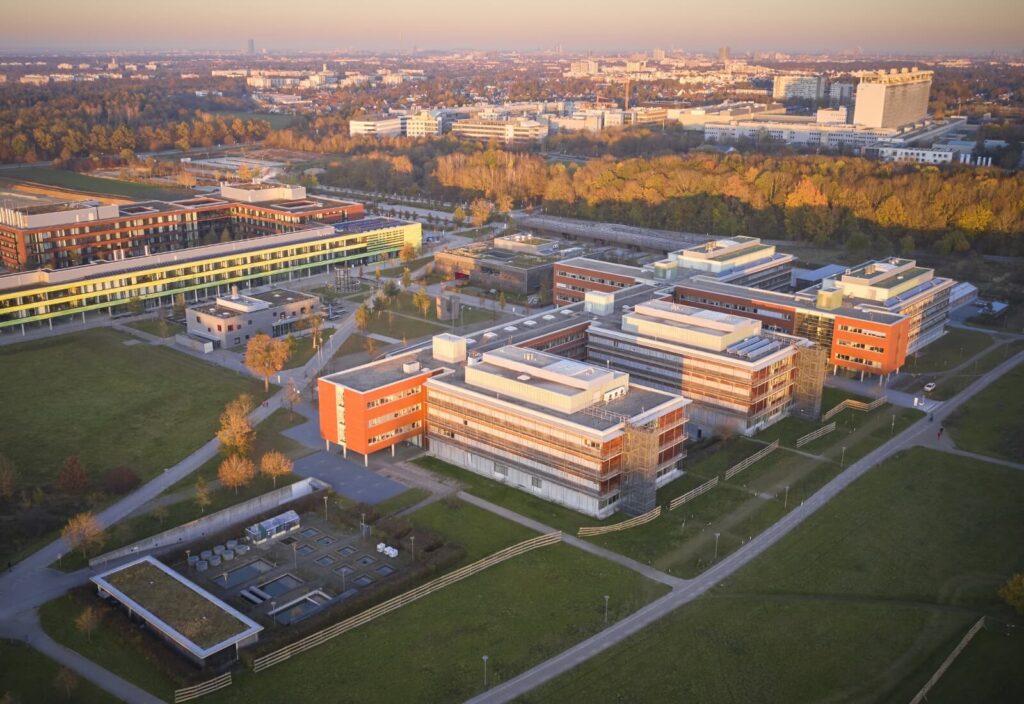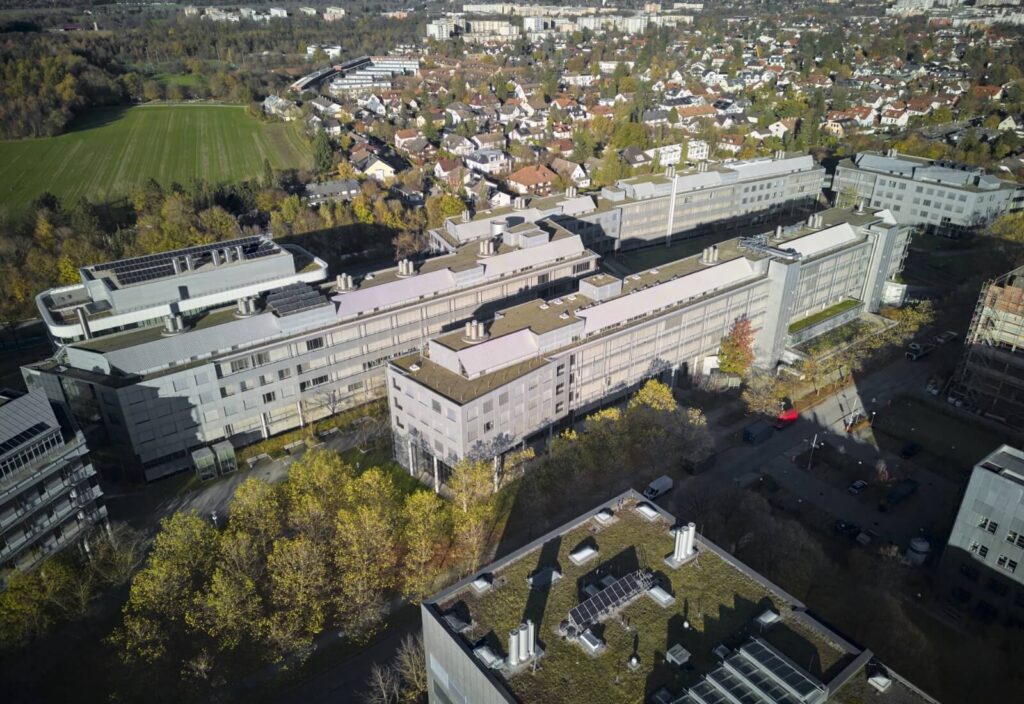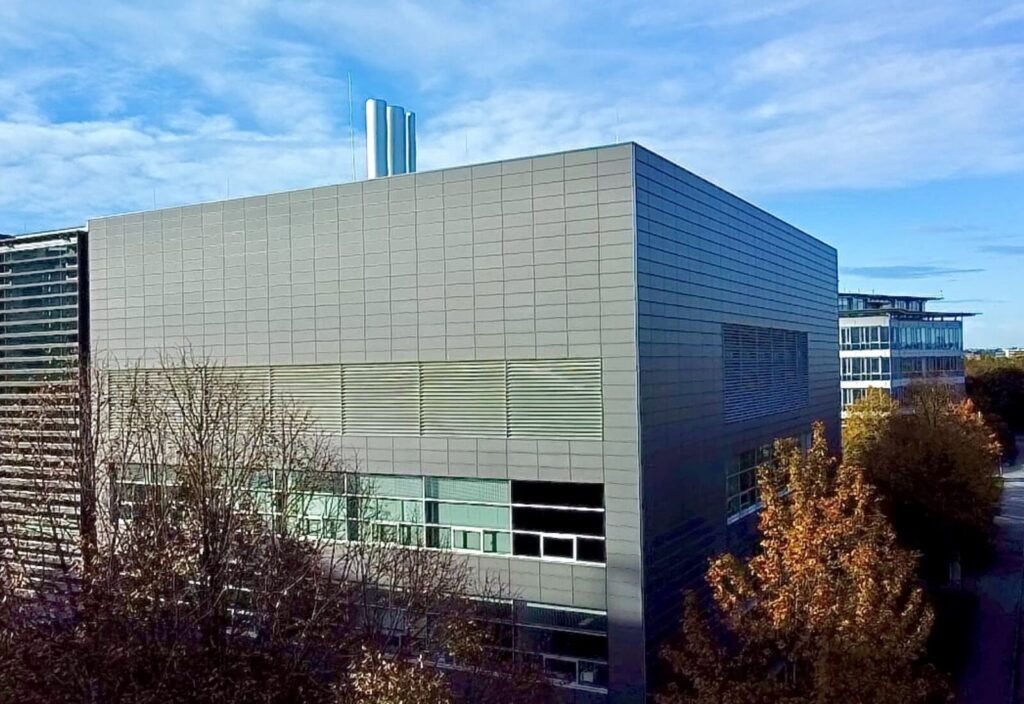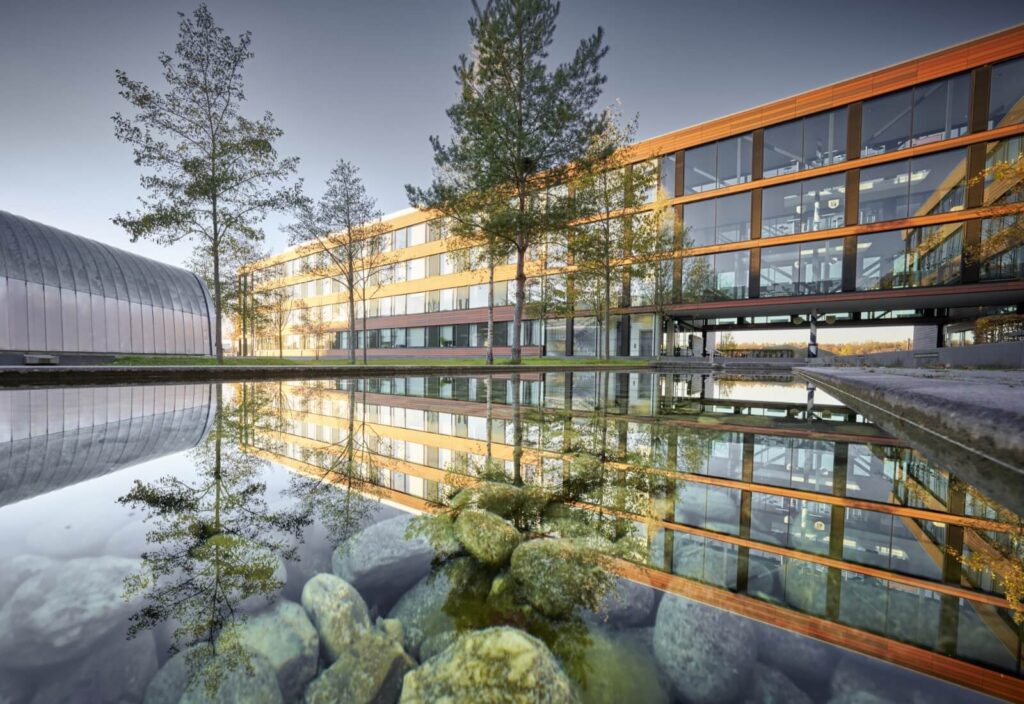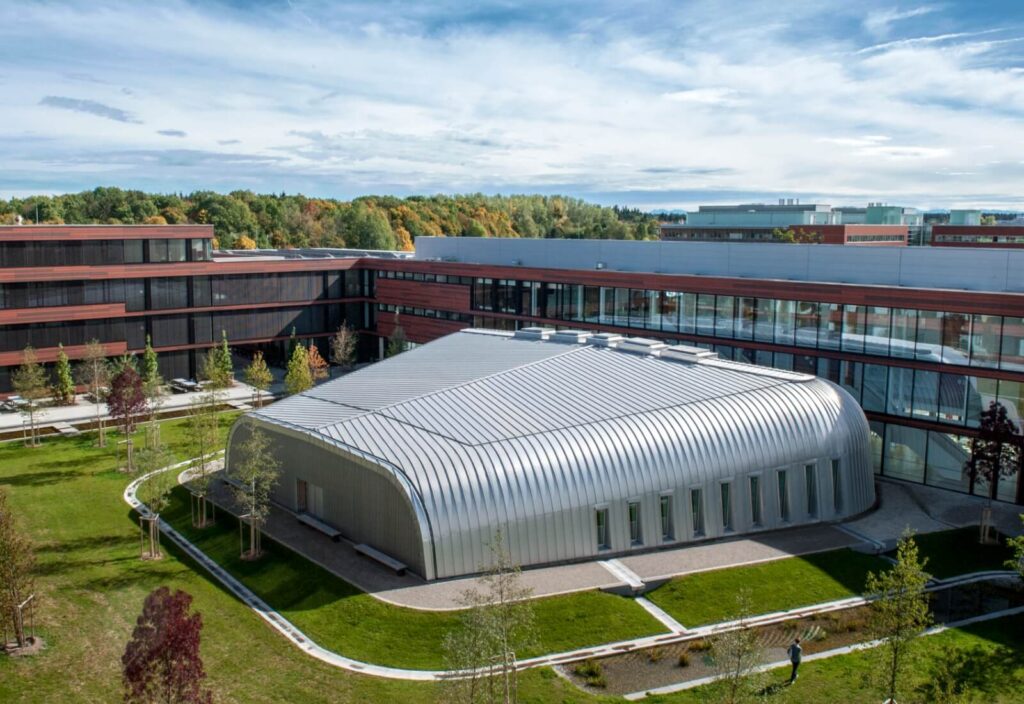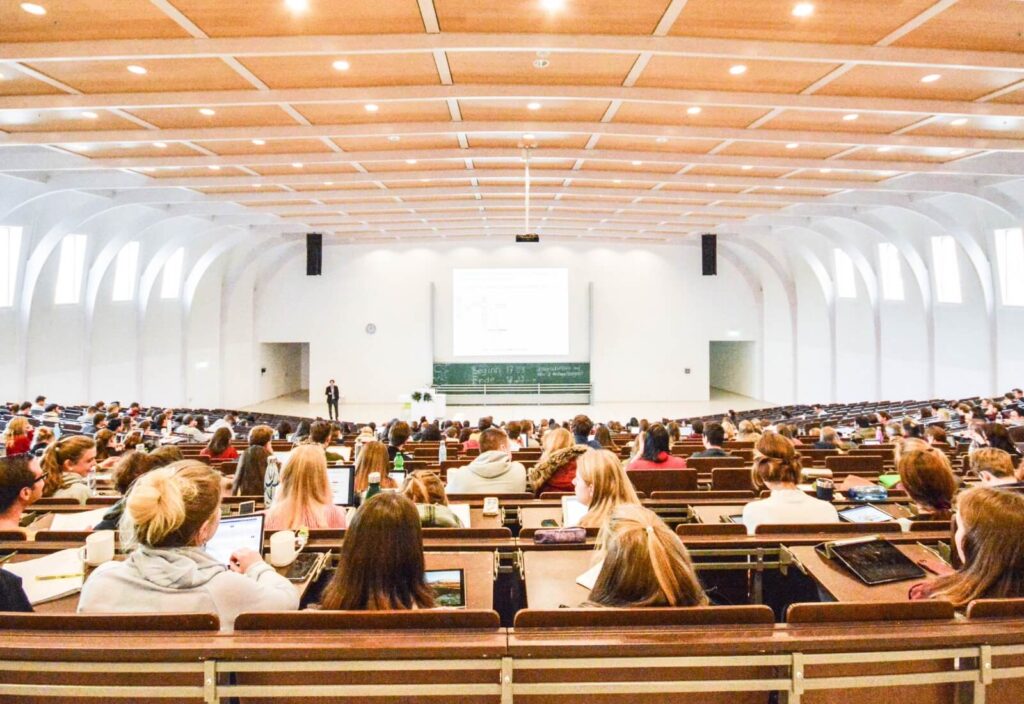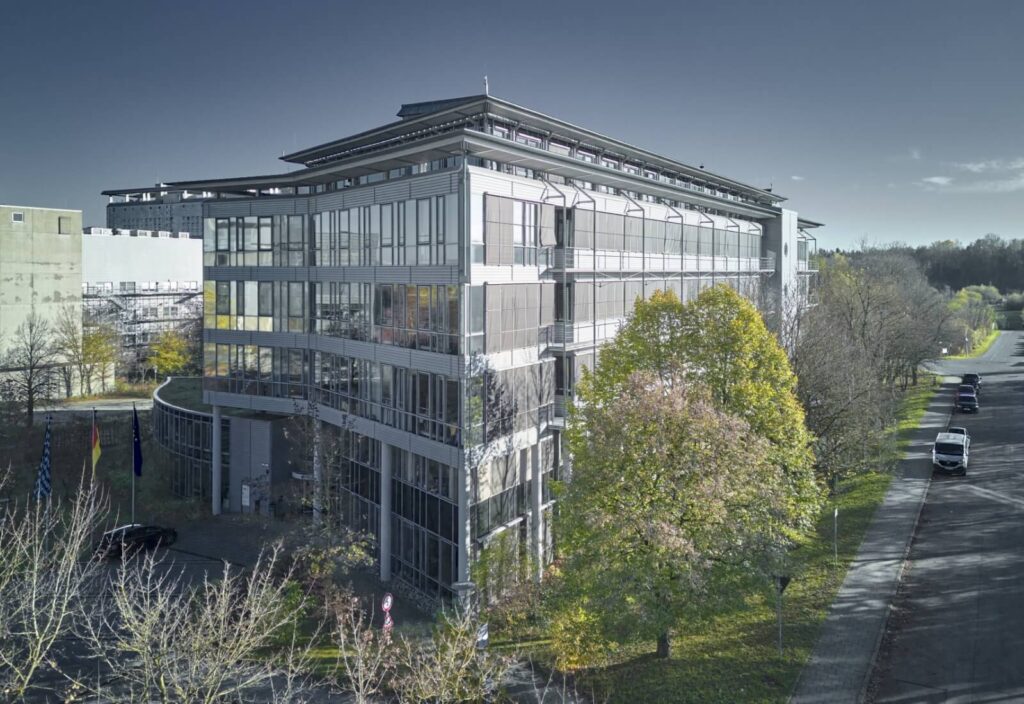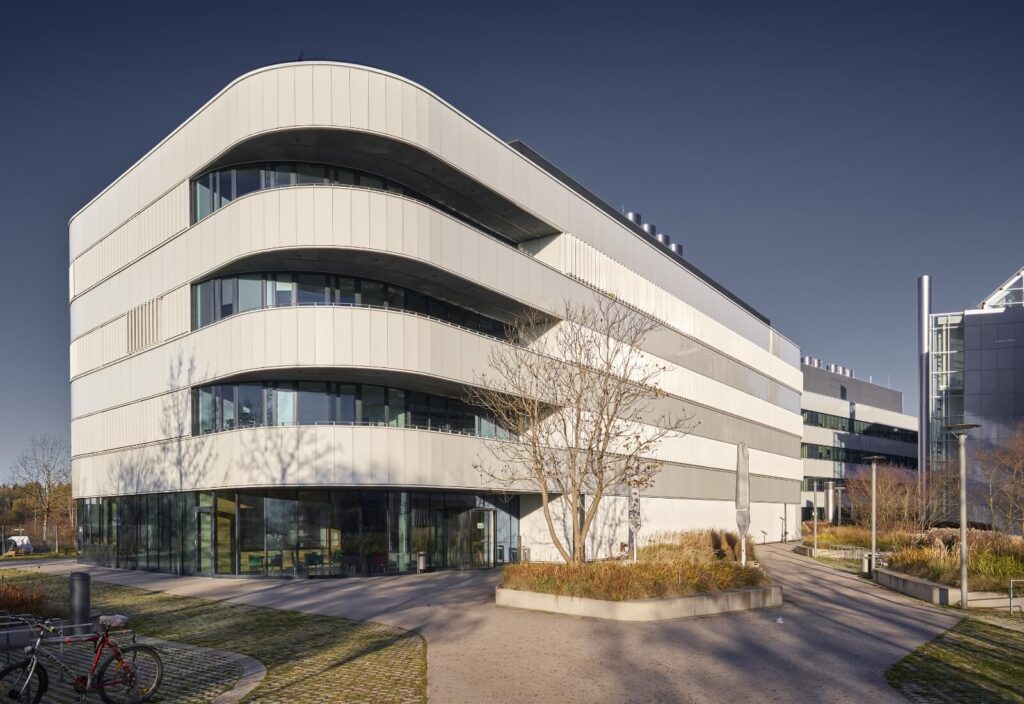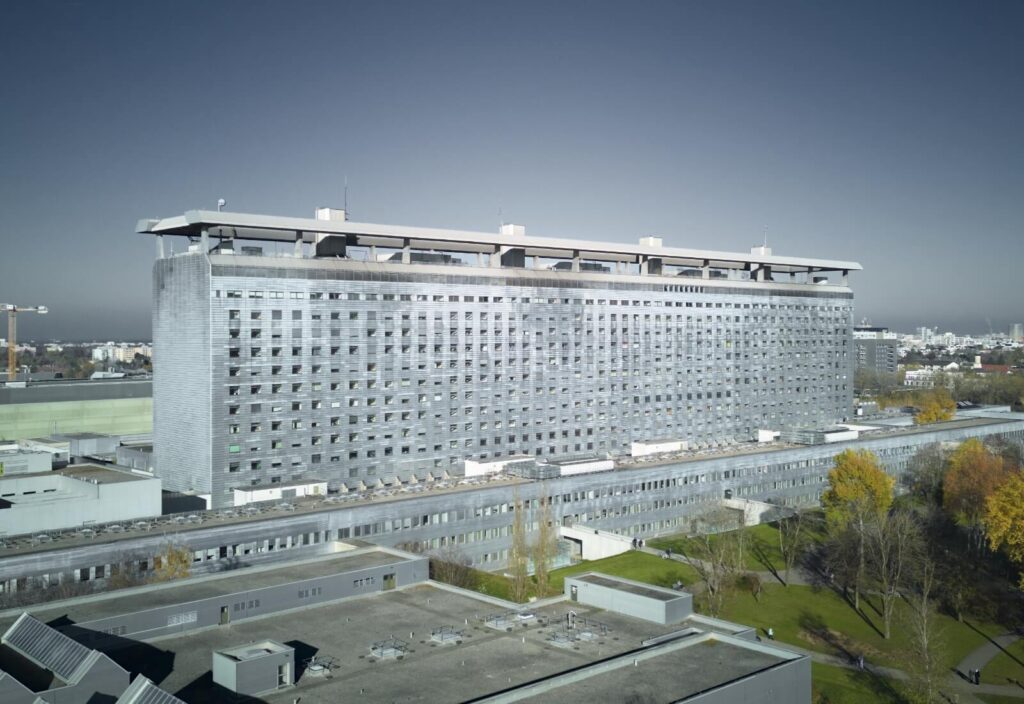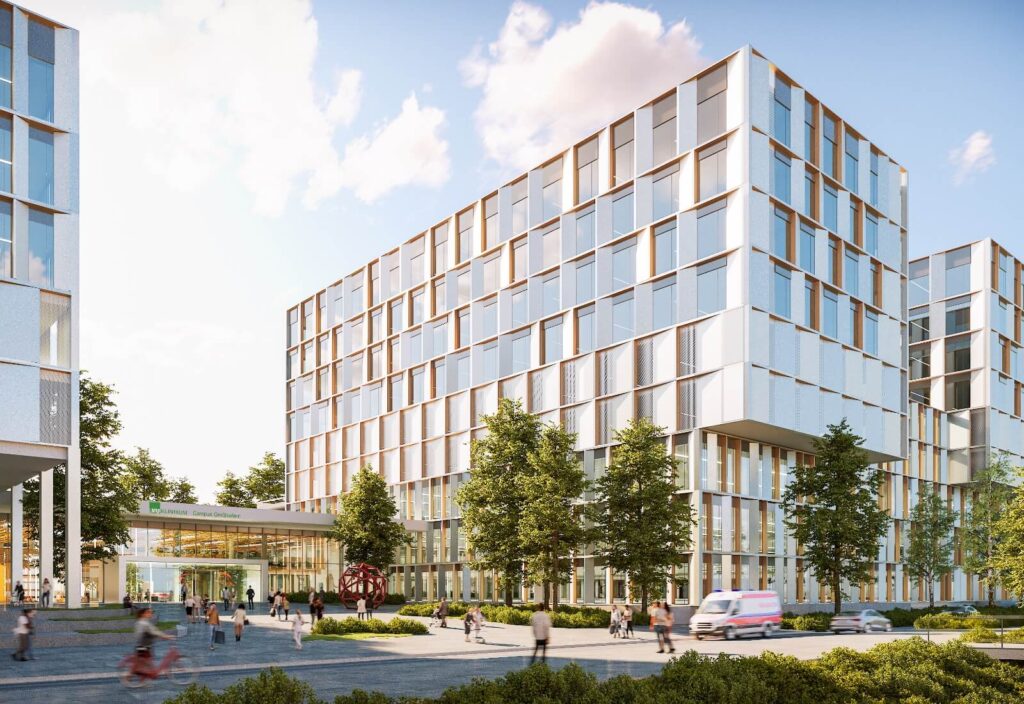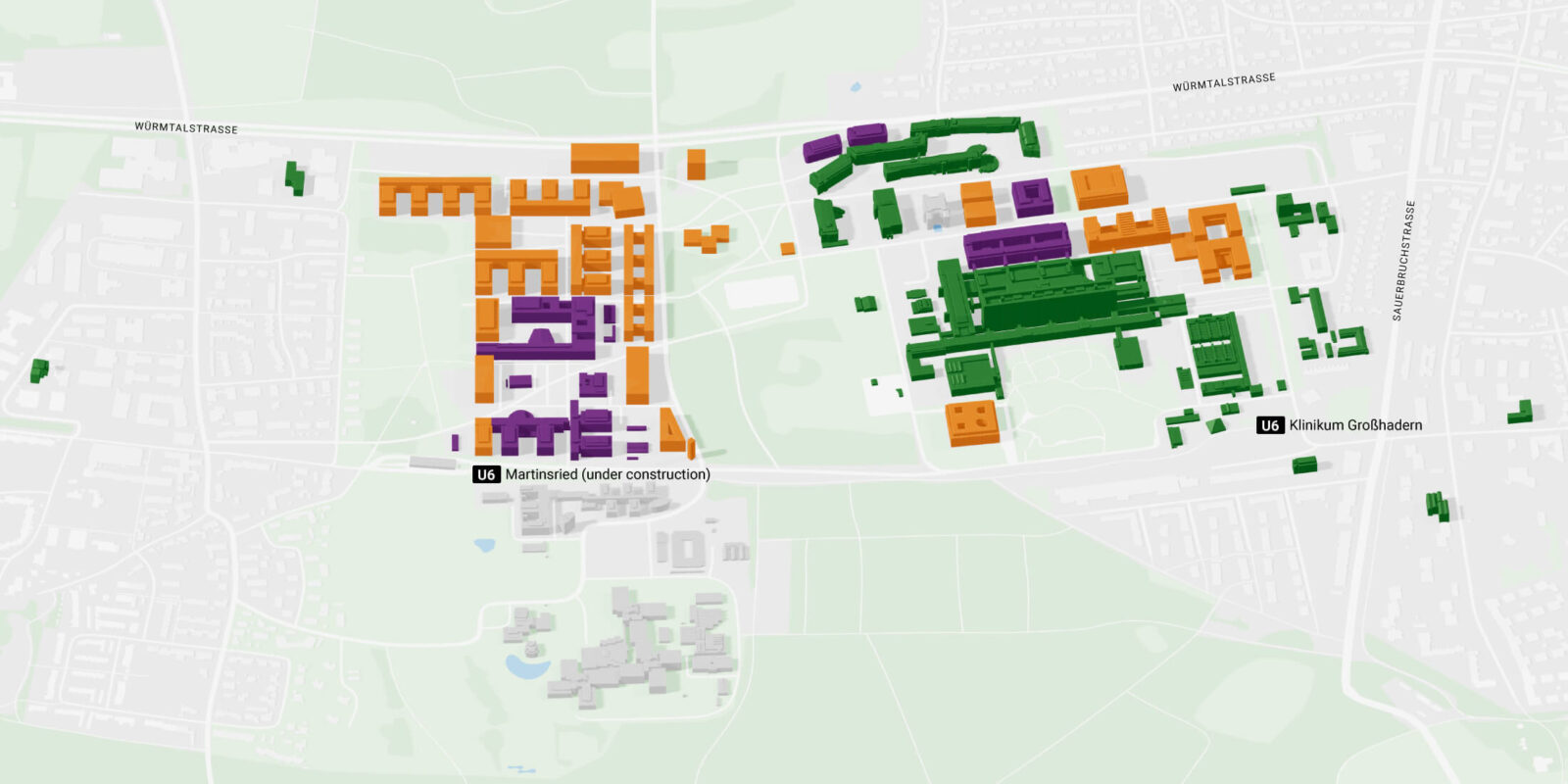
Veterinary Medicine
for Biotechnology
Center for Pathology
Campus Grosshadern/Martinsried
Situated in the southwest of Munich, the Grosshadern/Martinsried campus stands for highly integrated and world-renowned top-level research in the spheres of medicine and the natural and life sciences. At this site, the university is closely networked with the neighboring Max Planck Institute of Biochemistry, Max Planck Institute for Biological Intelligence, and Helmholtz Center Munich.
A one-of-a-kind cluster for natural and life sciences in Europe
The Faculty of Medicine – with LMU University Hospital Grosshadern and the Biomedical Center (BMC) – the Faculty of Chemistry and Pharmacy, the Faculty of Biology, and the Gene Center Munich are all located on the campus. The know-how from various areas of the natural sciences and biomedicine favors transitions from basic research to the world of practical applications.
The campus is designed such that it can develop, change, and grow in a sustainable manner – particularly on the land set aside for future extensions to the north of the Biomedical Center. In this way, research in the natural and life sciences at LMU will continue to be supported and shaped by innovative infrastructure in the future. Closely connected with these developments, LMU University Hospital will realize lighthouse projects on the campus over the coming decades, such as the redevelopment of its hospital facilities in Grosshadern.
Biocenter – Faculty of Biology
Completed in two construction stages in 2004 and 2008, the LMU Biocenter has a floor space of over 10,000 square meters. It provides the scientific departments and research groups at the Faculty of Biology with modern learning and laboratory rooms and unique opportunities for collaborative research. As an integral part of Campus Grosshadern/Martinsried, the Biocenter facilitates connections with other LMU facilities, such as the Gene Center Munich and the Faculty of Chemistry and Pharmacy, but also with neighboring non-university research organizations like the institutes of the Max Planck Society and the Helmholtz Association as well as various biotech companies. Systematic Biology will remain at its current address in the historical institute at Botanical Garden in western Munich, where all subdisciplines of the plant sciences were housed for almost 100 years before the move to the new campus.
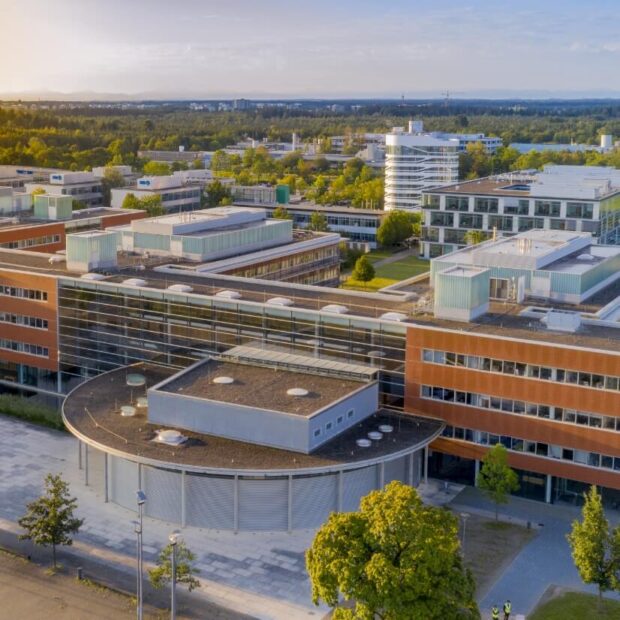
The LMU Biocenter provides the scientific departments and research groups at the Faculty of Biology with modern learning and laboratory rooms.
© LMU
Biomedical Center Munich (BMC)
Opened in 2015, the Biomedical Center brings together chairs and institutes for pre-clinical, clinical-theory, and clinical subjects in a facility with floor space of over 18,000 square meters. In addition, it contains core facilities offering state-of-the-art technologies for shared use, including high-tech methods for bioimaging, bioinformatics, protein analytics, biophysics, and flow cytometry. As most pre-clinical teaching for all human medicine students at LMU takes place at BMC, the facility possesses a teaching building – with 27 seminar rooms of various sizes, highly equipped course rooms, a library, and the largest lecture hall at LMU, which seats 950. Various energy optimization measures, such as the highly effective façade insulation, the use of groundwater for lab cooling water, concrete core activation, district heating supply, and a photovoltaic installation yield savings of 4,840 metric tons of CO₂ every year. Accessibility is also an important part of the BMC design, including a tactile navigation system – the first of its kind at LMU. This was installed in addition to the usual DIN accessibility provisions that apply to all new LMU buildings.
Gene Center Munich and Center for Molecular Biosystems (BioSysM)
The Gene Center Munich, which has been located on Campus Grosshadern/Martinsried since 1994, combines interdisciplinary research and teaching in key areas of modern biology. It is home to a total of 20 research groups, including groups from the Department of Biochemistry (Faculty of Chemistry and Pharmacy), independent junior research groups funded from within and outside the university system, and several groups from the Faculties of Medicine and of Veterinary Medicine. The main research areas of these groups are structural and molecular biology, genome and systems biology, innate immunity and infection biology, and translational medicine. This research infrastructure was expanded in 2016 with the construction of the state-of-the-art Center for Molecular Biosystems (BioSysM), located just 100 meters from the Gene Center Munich. A hub for systems biology research at LMU, BioSysM houses four chairs, each with its own junior research group, and a group for special imaging techniques. Collaborative exchange shapes not only the practice at the center, but also its building design. Laid out in the shape of a parallelogram, the four-story building has 3,700 square meters of floor space with extensive communication zones. A compact central block contains biochemistry, biophysics, computer, and robotics laboratories on its upper floors. Meanwhile, there is a conference room, a presentation room, and computer rooms, flanked by offices and seminar rooms, on the ground floor.
Center for Stroke and Dementia Research (CSD)
In 2015, the Center for Stroke and Dementia Research (CSD) opened its doors in Grosshadern. The building houses the Institute for Stroke and Dementia Research (ISD) and the Munich research groups of the German Center for Neurodegenerative Diseases (DZNE). Clinical and basic researchers work together at the center – under one roof and in direct proximity to each other – as they seek to understand the causes and risk factors of dementia and strokes and develop new therapeutic approaches.
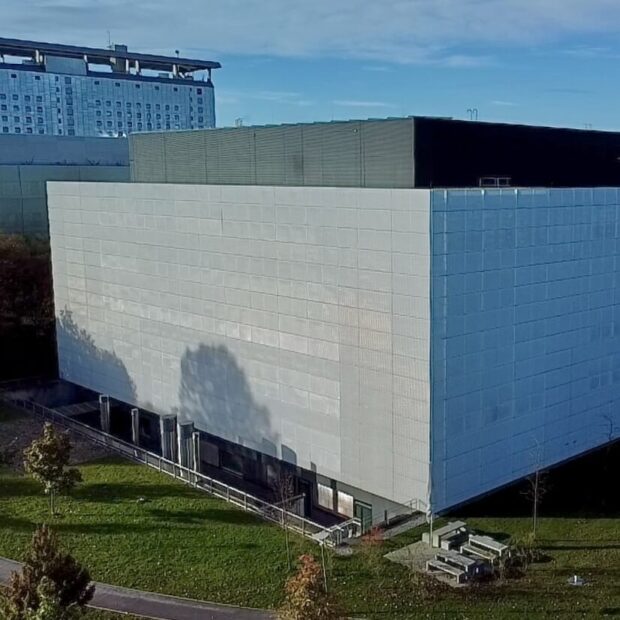
Located inside the Center for Stroke and Dementia Research building are the eponymous institute (ISD) and the German Center for Neurodegenerative Diseases (DZNE).
© LMU
Institute of Chemical Epigenetics – Munich (ICEM)
In May 2022, LMU opened the Institute of Chemical Epigenetics Munich (ICEM) for research into the epigenetic code and its adaptations to environmental changes. On 3,800 square meters of floor space over five stories, ICEM houses labs, offices, conference rooms, a central electron microscope facility, and devices for genome sequencing. Unusually, the ground floor has been declared a ‘professor-free zone’ for early-career researchers, who are provided with state-of-the-art equipment and ideal conditions to develop their research. The eco-friendly building uses renewable energy sources and saves 420 metric tons of CO₂ annually through heat recovery and energy-efficient technologies.
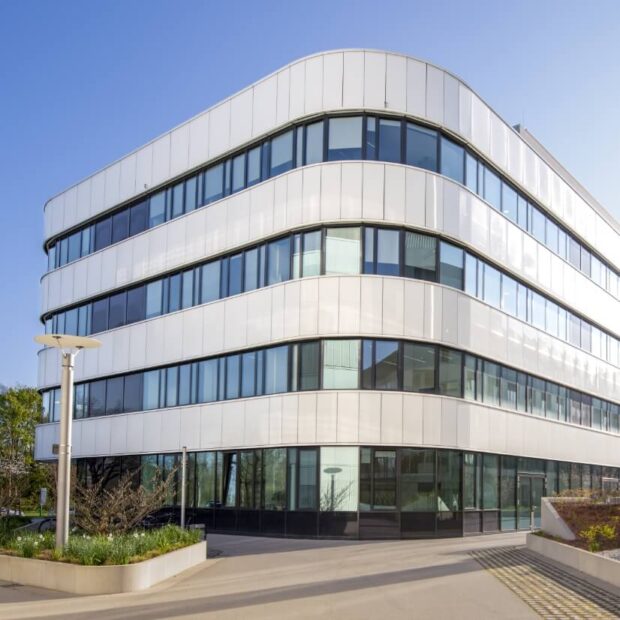
The Institute of Chemical Epigenetics – Munich (ICEM) offers ideal conditions for cutting-edge research at the interface between biology and chemistry.
© Christoph Olesinski/LMU
News from ICEM
The Institute of Chemical Epigenetics – Munich (ICEM) offers ideal conditions for cutting-edge research at the interface between biology and chemistry.
ICON and DIAG
The new ICON (Interfaculty Center for Endocrine and Cardiovascular Disease Network Modelling and Clinical Transfer) research institute is devoted to studying diseases of the cardiovascular system, which are one of the most common causes of death worldwide. By the end of 2024, state-of-the-art research infrastructure will be built on almost 2,200 square meters of floor space for the development of new preventive, diagnostic, and therapeutic strategies against cardiovascular diseases. The new building is being constructed along Feodor-Lynen-Strasse to the north of LMU University Hospital Grosshadern and combines biomedical research with clinical applications. Work on the adjacent DIAG building for bacteriology and virology diagnostics at the Max von Pettenkofer Institute is due to be completed at the start of 2025. With a floor space of some 1,800 square meters, DIAG will gather the formerly separated facilities of the Chairs of Medical Microbiology and of Virology in a single home. In addition to laboratories and offices, the building will contain a one-stop ‘diagnostic street’ (Diagnostikstrasse) and rooms for vaccination advice.
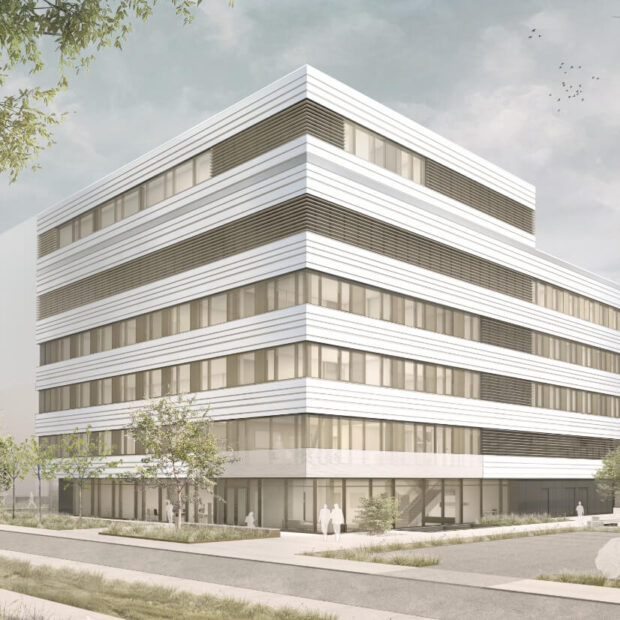
Rendering of new ICON (front) and DIAG (rear) facilities
© doranth post architekten
News from ICON and DIAG
LMU adds two key components to Campus Grosshadern/Martinsried. The ICON and DIAG buildings are taking shape.
New Dr. von Hauner Children’s Hospital
In March 2023, construction began on the new Dr. von Hauner Children’s Hospital building on the campus. The internationally renowned hospital is due to move from the city center to Grosshadern at the end of the decade. Over seven stories, the building will contain almost 200 beds and house under one roof the Clinics for Pediatric Medicine and Pediatric Surgery together with the Integrated Center for Social Pediatrics and other facilities. The new hospital will be connected to the obstetrics facilities in the adjacent ward block. The Neonatology, Pediatric Cardiology, and Pediatric Palliative Care units are already located on the campus. Thanks to its square groundplan and 19,200 square meters of floor space, the new hospital building will offer short walking distances and opportunities for interdisciplinary networking. Meanwhile, four interior courtyards, play areas, and a cafeteria will provide for a pleasant, family-friendly environment.
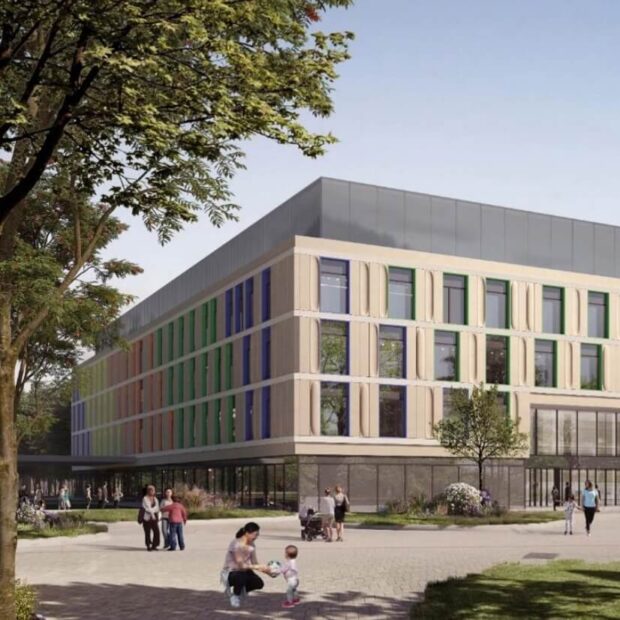
Rendering of new Dr. von Hauner Children’s Hospital
© LMU University Hospital
News from Dr. von Hauner Children’s Hospital
Over the next six years, a state-of-the-art university hospital for pediatrics and adolescent medicine will be built on LMU’s Grosshadern campus.
Redevelopment of Grosshadern hospital campus
In the most extensive hospital construction project on a contiguous campus in Germany, the LMU University Hospital site at Grosshadern is going to be redeveloped. More than 40 years of service have taken their toll on the building and supply structures of the hospital facility in Grosshadern. A renovation no longer makes sense from operational, medical, or economic standpoints. It is planned, moreover, to incrementally transfer the main functions of the hospital to Grosshadern. The existing building will be replaced by modern buildings in several stages. These new structures will be erected on the core area and on additional areas to the east and the north. The patient garden in the south of the ward block will be preserved and continue to be used for the rest and relaxation of patients and staff.
As the first step toward renewing the location and optimizing patient care, a new Surgical Center was opened in 2014, with 32 state-of-the-art operating rooms, a central emergency department, an outpatient surgery center, and a central sterile supply department.
The first construction stage of the new hospital site on Campus Grosshadern, which will inaugurate the necessary process of clearing the old building stock, will encompass a floor space of approx. 70,000 m². In addition to the DIAKUM Diagnostics Center, the Cardiac and Pulmonary Vascular Center and the Oncological Center will be constructed. From the mid-2030s, patients and visitors will be able to access the new centers as well as the existing structures, which will remain in operation for the time being, via the new main entrance toward Marchioninistrasse.
